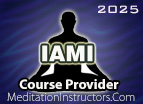
|
UHT Affiliations |
|
University of Holistic Theology is an Institutional Member of the Florida Distance Learning Association (FDLA) - an affiliate of the United States Distance Learning Association (USDLA) C.MI Affiliations C.MI is an IAMI Provider All Zen Meditation information and background provided during the C.MI. program (by Stephen Rinaldi, D.MT.), is done under consultation with the Kokorono Sato Center - Ito, Japan - Under the guidance of Kondou Satoshi. C.MI Students and Graduates come from all over the world! Countries Represented: Aruba Canadian Alberta Australian Australian Capital Territory US States Represented: Alaska Enjoy your studies with C.MI students from around the world!
|
Meditation Instructor Certification Program - C.MI. |
Common C.MI. Course Questions Q. I'm not sure I want to teach meditation. Would C.MI still be beneficial for me? Q. Does the C.MI course focus upon a particular type of meditation practice ? Beyond its popularity as a personal development tool, Mindfulness Meditation is currently a primary style for teaching meditation in the medical field (patients and physicians), Mindfulness-Based Stress-Reduction (MBSR), educational institutions (children and adults), corporate wellness settings - and even some high-security prison systems in the USA and worldwide. You've likely seen a great increase in recent years of traditional research showing Mindfulness Meditation to be a highly effective and safe practice. Resources and links to research papers and ongoing studies are provided during the C.MI. course, as they become available. Note, however, that the course is not a traditional program in the sense that we focus only on one particular tradition or method. C.MI encompasses a wide range of meditation practices (both traditional and more "modern" techniques and practice tools). We also cover a variety of other styles and practices during C.MI as a way to help the student gain a broad basic understanding of the most common meditation practices. We discuss topics and practices such as Guided Meditation, Moving Meditation, Teaching Children, Using Audio-based Meditation tools, etc. New materials and resources are added continuously. We will also examine the basics of Zen style (Rinzai) under the oversight of Kondou Satoshi of the Kokorono Sato School in Ito, Japan. Zen Meditation topics are covered during the program as a way to help round-out the student's knowledge of meditation styles and history, as well as the variety and uniqueness of the various practice styles. Kokorono Sato has also developed a very successful approach for teaching meditation to children - and we will cover some of the basics of this approach during the C.MI program. Q. What is the Practical Requirement for C.MI? Q. Do I need to submit video documentation of my practice? Q. Can I really learn meditation / how to teach meditation online? Students are responsible for purchasing (or borrowing) the two required texts for the course. The approximate cost for these two books (if you purchase them) is about US$12 - $15 each (plus any shipping costs). Many public libraries (in the USA and possibly other countries as well) will also have these two books available to borrow. Both books are also available in Amazon Kindle format - for reading on your computer, tablet, Kindle device, or other mobile device. Q. Are there any extra costs besides my tuition and books? Q. How long will the course take from start to finish? Students are expected to complete the course requirements within a 1-year period - or to be making good progress toward completion by that point. If an active student (one working at a reasonably steady pace) finds they need a bit more time to complete the program requirements, that is usually fine -- provided the student contacts the C.MI Administration Office to request a short extension by the 10th month after original registration. Additional terms may apply - including specific details for inactive students. Please see below for details. Q. What's the fastest I can complete the course? Q. Once I complete the C.MI requirements, do I need to be re-certified at some future date? Q. Do students automatically receive certification upon successful completion of the course? Q. Is certification required to teach meditation? Q. I've seen some meditation certificate programs with a much higher (or lower) tuition cost. What's the difference? The C.MI program is one of a very few meditation certification courses that includes substantial graded course work, exams, ongoing student / faculty group communication - plus an additional 60-hours of documented, reviewed and graded practice. C.MI is an IAMI Course Provider (International Association of Meditation Instructors). C.MI Graduates are eligible for a discounted rate on their IAMI Level-2 Instructor membership - Visit the IAMI for more details (link opens in a new window). The C.MI. program is managed by a team (BBI) with substantial experience in developing interactive online education programs. The C.MI. campus is a dynamic private campus system that allows for interaction and learning with fellow students located all around the world. Q. Can I enroll in a resident program for this course, or complete it by mail correspondence? Q. Who is the C.MI Course Instructor? Q. Do other schools offer this same C.MI program? Q. How long has the C.MI Program been running? Q. Is the C.MI course open to people of all spiritual paths and / or religious beliefs? Q. Are there any prerequisites for enrollment? Participants should possess a sufficient reading and writing level. The course is organized similar to any college-level course in that it includes graded writing assignments of 4 - 5 pages in length, along with some fairly complex reading material. The C.MI program has been designed to be intensive, practical, challenging, motivational, and highly thought-provoking - but, not overly academic. Overall, we want your experience with C.MI to provide you with highly practical knowledge and skills you can use to expand your personal practice and help instruct others to do the same. Q) Is CEU credit available for the C.MI™ course? A) For those seeking CEU (Continuing Education Units) credit for their C.MI. course work, note that we have organized the course outline in accordance with accepted CEU standards (i.e., IACET Standards). At the time of this writing, we estimate the course to qualify for approximately 150-hours of contact-time (all course work, including documented practice time). With each 10-hour period equaling 1 CEU, graduates of the C.MI program are eligible for approximately 13 - 15 CEU's for completion of the course. Again, this is only an estimate at this time - and subject to change. If you require a specialized CEU (for continuing education, transfer credit, licensing, etc.), please make sure to contact the receiving party for their requirements. More details will be provided on this web site as they become available. Q) What is the refund and/or withdrawal policy for the C.MI™ course? Those paying their tuition using one of our Extended Tuition Plan Options will have separate withdrawal policy terms. Please visit the Tuition Options page for details. Q) What is the reinstatement policy if I become inactive with the C.MI™ Course? Limited extensions beyond one-year are often approved for those students who submit a request in writing, provided that the student has been submitting course work - accessing the course campus regularly - and is moving toward completion of the program within 30 days of their one-year course period. We know that life can sometimes get in the way of even the best plans, however - and we're here to help you get back on track with your study and practice if you've been away from the course for a while. Inactive students (up to 3 years inactive) may come back into the course by submitting the standard Reinstatement Fee of US$125. Your reinstatement is active for another one-year period - and the student must either complete the course successfully during that period -- or, if needed, another one-year extension / reinstatement may be purchased to extend your course time. For those who have been inactive for 3 to 5 years, the reinstatement fee is US$175. If you have been inactive for more than 5 years (or have withdrawn from the course in the past and wish to return, please contact the C.MI Admin Office to discuss your options: cmi@meditationinstructor.org Q. I am from outside of the USA. Will that be a problem? Q. Do I need any special computers skills or software to take part in the course? The course campus is accessible via computer, tablet, and most modern mobile devices. Ideally, you will use a standard computer (desktop / laptop) to type your course work and/or post to the course discussion forums. If you use a tablet, a separate keyboard is strongly suggested for typing. While you can access the campus using a smaller mobile phone, the text will likely be quite small - so, we don't recommend using a phone as your primary method - although it can be handy for the occasional check-in. As for software --- You'll just need a common word processing software to complete your written assignments and practice journals. We rely primarily on Microsoft Word -or- Apache Open Office Writer (the assignment templates are provided in those two formats). However, there is no need to purchase software. If you do not have Microsoft Word available to you, Open Office Writer is available free (and is an excellent software program as well). A PDF document reader software is also required for reading many of the supplementary handouts and course guides. Most computers (and mobile devices) today will include Adobe Reader or similar - so, it is very likely you'll already have what's needed. The reader software is also available as a free download if needed. More details are provided in the orientation e-mail you'll receive after registration (and within the C.MI Campus, as well). |
|
|||
Tuition for the full C.MI™ Program is: $595* Extended Tuition Installment Options are Available ** The Online Campus System (and this C.MI™ Certificate Program) is managed for UHT by BBI - a full-service inter-cultural communications company specializing in online education and training, educational TV / film production and inter-cultural consulting. For More Information visit: www.bbiworld.com University of Holistic Theology (UHT) is approved as Religious-Exempt by the Commission for Independent Education, Independent Colleges and Universities, Non-Secular Division, Florida Department of Education. The institution offers only educational programs that prepare students for religious vocations as ministers, professionals, or laypersons in the categories of ministry, counseling, theology, education, administration, music, fine arts, media communications, or social work. ( Florida Statute 1005(1)(f)(2). |
|||
© 2010 - 2025 University of Holistic Theology, Inc. - All International Rights Reserved





